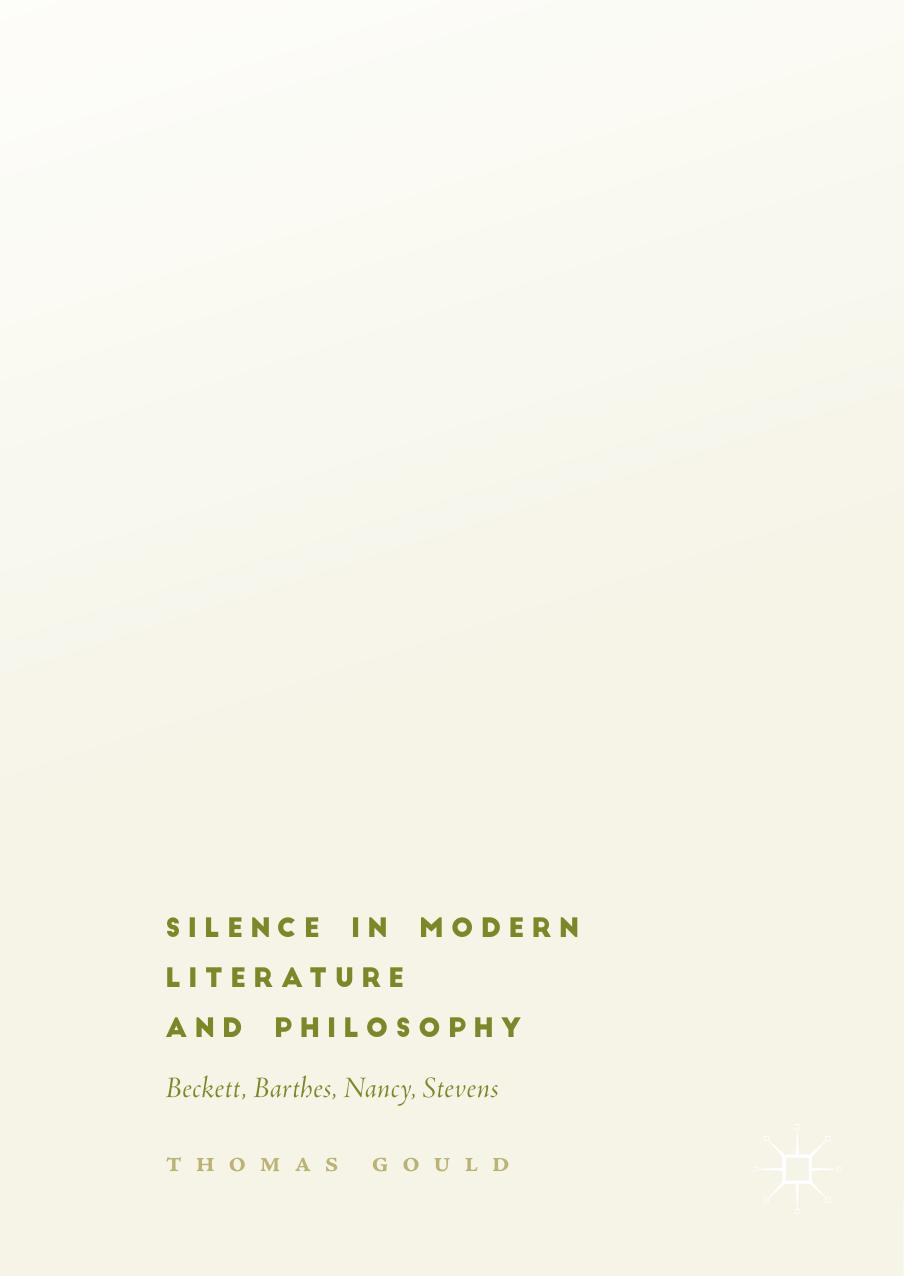Silence in Modern Literature and Philosophy by Thomas Gould

Author:Thomas Gould
Language: eng
Format: epub, pdf
ISBN: 9783319934792
Publisher: Springer International Publishing
Unavowable/Unsayable/Ineffable
I would now like to consider further the way in which “silence” in Blanchot’s The Unavowable Community might be thought in relation to the “unavowability” of the title, specifically through Nancy’s response to Blanchot’s use of those terms in “The Confronted Community”, an essay which was dedicated to the then nonagenarian Blanchot. As I read it, the title “The Confronted Community” resonates on two levels, the first of which is unavoidable, and which requires little elucidation: it was written, in part, in October 2001. The other level is related more to Nancy’s relationship with his own thought. This is, with the exception of perhaps “The Intruder” (L’Intrus), as introspective as Nancy gets (but, as with “The Intruder”, Nancy’s introspection is not a matter of autobiographical indulgence, but rather finds itself refracted from the particular and towards broader ontological questions). This essay finds Nancy , as a thinker, questioning and confronting the idea of community that figured so prominently in his earlier work, and looking back over the philosophical trajectory that has led him from “community” to what Christopher Watkin calls the “non-essentialized, non-localizable ontology” of Being Singular Plural, (and as such, this essay offers a means of setting up my own discussion of that later work) (Watkin 2007, 57). Nancy seems to admit defeat, conceding that the undesirable connotations of community, despite his best efforts, are “invincible”. This admission, in part, seems to have been informed by unfavourable reaction to Nancy’s book in Germany, where those invincible connotations were brought even further to the fore with the translation of “community” into the rather more historically loaded term Gemeinschaft (Nancy 2009, 25). “Community”, it seems, if we are to shift into a metaphor of auditory silence, was rather too loud (that is, too obdurately paradigmatic) a term which, despite the best attempts at neutralisation, amelioration and “unworking”, could not quite be silenced. And so, Nancy writes that he resolved instead to focus on the “with”, explaining that it is “almost indistinguishable from the co- of community , yet it carries with it a clearer indication of the spacing at the heart of proximity and intimacy. “With” is plain and neutral” (Nancy 2009, 25). As I have already suggested, this move away from “community” and towards “with” belongs to a kind of strategy of silence, and I do not think it is a coincidence that Nancy dedicates much of the rest of the essay to Blanchot’s use of the word “unavowable”, passages which are rich and revealing, and which recall Blanchot’s deconstructions of apophatic logic, dwelling in that liminal zone between silence and speech: “What is unavowable is not unsayable. On the contrary, the unavowable is continually said, or speaks itself, in the intimate silence of those who cannot avow […] I imagine that Blanchot would want to intimate to me this silence and what he says: he wanted to prescribe it to me and make it enter my intimacy, as intimacy itself” (Nancy 2009, 25, my emphasis). Here, Nancy both expounds on and compounds the idea of silence as an “unavowable” communicability between singularities.
Download
Silence in Modern Literature and Philosophy by Thomas Gould.pdf
This site does not store any files on its server. We only index and link to content provided by other sites. Please contact the content providers to delete copyright contents if any and email us, we'll remove relevant links or contents immediately.
| African | Asian |
| Australian & Oceanian | Canadian |
| Caribbean & Latin American | European |
| Jewish | Middle Eastern |
| Russian | United States |
4 3 2 1: A Novel by Paul Auster(12356)
The handmaid's tale by Margaret Atwood(7732)
Giovanni's Room by James Baldwin(7303)
Asking the Right Questions: A Guide to Critical Thinking by M. Neil Browne & Stuart M. Keeley(5742)
Big Magic: Creative Living Beyond Fear by Elizabeth Gilbert(5728)
Ego Is the Enemy by Ryan Holiday(5395)
The Body: A Guide for Occupants by Bill Bryson(5066)
On Writing A Memoir of the Craft by Stephen King(4921)
Ken Follett - World without end by Ken Follett(4707)
Adulting by Kelly Williams Brown(4554)
Bluets by Maggie Nelson(4535)
Eat That Frog! by Brian Tracy(4502)
Guilty Pleasures by Laurell K Hamilton(4428)
The Poetry of Pablo Neruda by Pablo Neruda(4081)
Alive: The Story of the Andes Survivors by Piers Paul Read(4011)
White Noise - A Novel by Don DeLillo(3992)
Fingerprints of the Gods by Graham Hancock(3980)
The Book of Joy by Dalai Lama(3962)
The Bookshop by Penelope Fitzgerald(3829)
